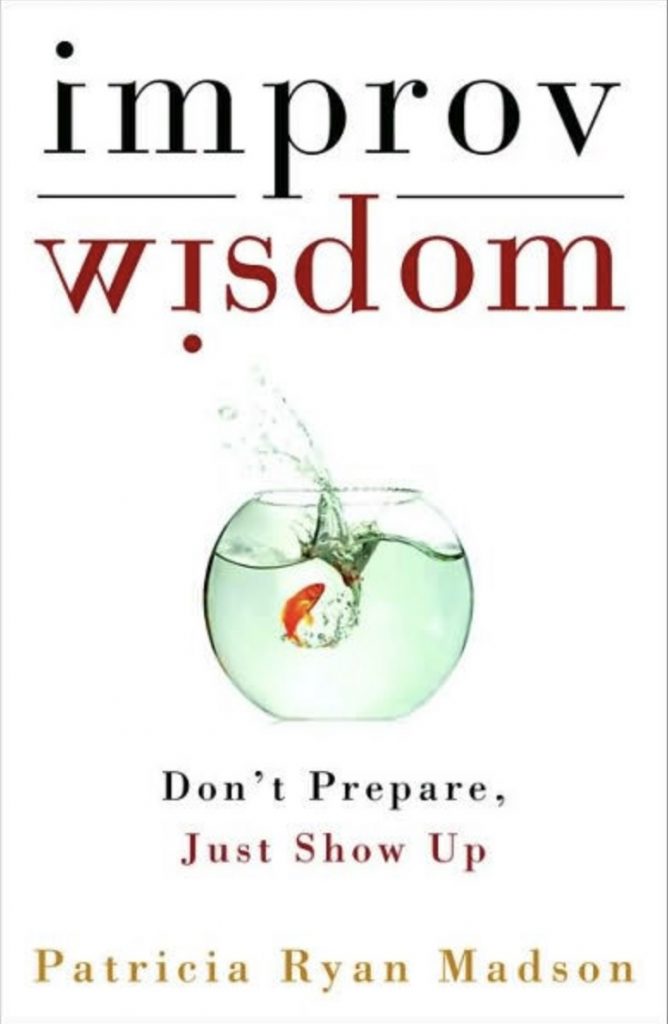Key Quote
“Lighten up” (p. 113). — Patricia Madson
Key Points
Say Yes. Open up to what comes along. Make your first response to note and verbalize what is right about something. “Become a can-do person” (p. 27).
Don’t Prepare. Redirect your energy into “the present moment” (p. 35).
Just Show Up. Don’t avoid showing up because of how you feel about something; “Be there, physically.” “Move your body toward your dreams” (p. 45).
Start Anywhere. “With a big task or a confusing problem, when you don’t know where to start, begin with the most obvious thing, whatever is in front of you” (p. 53).
Pay Attention. Develop and hone your skills of listening and observing. Be in the moment and “notice something new” (p. 73).
Face the Facts. Apprehend the reality of the situation (and the people) you are working with, and then purpose to add rather than subtract. “Use what is given. Build upon it” (p. 77).
Stay on Course. Never forget the main point. Don’t lose sight of the goal of what you are doing.
Wake Up to the Gifts. Open your eyes to the people, things, and events all around you now and in your past which have served you, supported you, or added to your life in some way. Lose your sense of entitlement and see the many small and large gifts you have been blind to.
Make Mistakes, Please. “Take a risk” and own, embrace, and learn from mistakes (p. 105).
Act Now. Stop avoiding essential tasks and “act in order to discover what comes next.” Try doing things in a different way or place (p. 122).
Take Care of Each Other. Reject selfishness and make the situation work for the betterment of the people around you.
Enjoy the Ride. “Having fun loosens the mind” (p. 137).
Key Concepts:
Say Yes
The secret of improvising is saying “yes.” Without being confused for being a “yes-man.” Saying “yes” engages you to seize your first idea with confidence (p. 27).
Improv comes alive with the notion of “yes and.” By substituting “yes and” for “yes but,” you are agreeing to the process and moving it further in a positive direction (p. 30).
“This yes invites us to find out what is right about the situation, what is good about the offer, what is worthy in the proposal. Exercising the yes muscle builds optimism” (p. 32).
When you don’t say yes, you commit the cardinal sin of improv: blocking. “Blocking comes in many forms; it is a way of trying to control the situation instead of accepting it. We block when we say no, when we have a better idea, when we change the subject, when we correct the speaker, when we fail to listen, or when we simply ignore the situation” (p. 29).
Don’t Prepare
“‘Don’t prepare,’ really means to let go of our ego’s involvement in the process” (p. 39).
When you stop trying to show off your brilliance, you negate self-absorption and can focus on answering what is asked.
“The habit of excessive planning impedes our ability to see what is actually in front of us. The mind that is occupied is missing the present” (p. 35).
When experiencing performance anxiety, changing your attention can provide relief. “Fear is a matter of misplaced attention. Focus on redirecting it” (p. 44).
Just Show Up
“Be on time for the sake of others. Show up on time for yourself. Lost time is never found” (p. 52).
Become aware of exhausted behaviors. Although some rituals can help provide welcomed constancy, you can also feel deadened by unchanging habits.
“Explore a new vantage point.” Simply changing the location of a routine activity can enable you to refresh and awaken from tired habits (p. 51).
Just as Michael Phelps flaps his arms before every heat, some simple rituals are important for providing stability. “Ironically, stability is a vital element when we improvise” (p. 49).
Start Anywhere
“With a big task or confusing problem, when you don’t know where to start, begin with the most obvious thing, whatever is in front of you.” You will rob yourself of time if you try to start everything from the “proper” beginning or the ideal place (p. 53).
Grab hold of your first thought. “Sculpt, correct, refine, and redirect your thoughts on the fly as you speak” (p. 56).
“To improvise is to create order out of chaos. It is more of an engineering job than an artistic one”
(p. 56). Madson goes on to explain: “Real speech (improvised speech) will always be more interesting, attention-getting, and persuasive than its scripted sister” (p. 57).
Improve speeches by eliminating the script. Instead, write questions to yourself and answer them using your natural speech pattern. “When I use the scripted text it becomes difficult to add anything. I naturally focus on reading the prepared text well. However, when I am answering a question, using the second method, my mind becomes active in organizing information in real-time. The result is more natural” (pp. 57-58).
Pay Attention
“Life is attention, and what we are attending to determines to a great extent how we experience the world” (p. 67).
Participate in focused listening: “Listen completely. Once a day devote your attention 100% to someone who is speaking to you. Focus completely on what is being said. Look at the person as you listen. If you notice your mind drifting, simply bracket your thoughts temporarily and return your attention to the speaker. Listen as if you needed to repeat what is being said in perfect detail. Observe how this effort pays off” (p. 74).
Face the Facts and Stay on Course
Go one step further than saying yes; accept and say yes to what is given, and then build upon it.
“Saying yes is like accepting the bite of apple that is being offered. Facing the facts implies that we chew on the apple, allowing it to nourish us” (p. 77).
Accept what the other person is offering and add more value. “Dealing well with people we like is easy; the mark of a fine improviser is his ability to work skillfully, kindly, and respectfully with those with whom he has difficulty” (p. 79).
“Improvising has much in common with riding a bicycle, surfing, or skiing. Things are not stable, linear, or predictable” (p. 81).
“Life is all about balancing, not about being balanced” (p. 81).
Once you accept this instability as a norm, it will become less unsteady: “And sometimes this sense of being off balance is exhilarating and reminds us of the impermanence and fragility of life, nudging us to appreciate each imperfect, teetering moment we are alive” (p. 82).
Improv always “has a point.” “We need to keep in mind what we are aiming for. Instead of asking, ‘What do I feel like doing?’ substitute ‘What is my purpose now?’ The difference in the answer may be illuminating” (p. 84).
Make Mistakes, Please
“If you are not making mistakes, you are not improvising” (p. 113). A constructive response to a mistake is to notice it, acknowledge it, and, if possible, use it” (p. 104).
Embracing mistakes is not meant to encourage mindless action or sloppiness, but, rather, the goal is the ability to take a risk and be resilient in the face of failure (p. 105).
Don’t be too careful to avoid mistakes. Be aggressive in using your limitations as assets through improv. This mantra is encompassed in the French word bricolage: “It’s the art of commandeering materials at hand – what is most obvious – to solve the problem” (p. 111).
“Improvising, or dealing artfully with what is already there, can be understood not only as a backup approach, but also as a way of life” (p. 111).
Take Care of Each Other
“Learning how to work together moment by moment without a known formula is the essence of improvisation” (p. 126).
In the world of improv, there are no set leaders or followers. Each person is responsible for staying focused and alert to the ever-changing scene. “Doing what needs to be done becomes the guiding principle” (p. 127).
The word “talent” includes all the key characteristics of a great improv team. It is “listening carefully, observing the actions of others, contributing, supporting, leading, following, filling in the gaps, and looking for the appropriate ending” (p. 126).
Madson explains that “an entrepreneur should always deliver more than she promises.” And she adds, “Whenever possible, be generous” (p. 135).
Tips for sharing control with others:
“When you see something that needs to be done, do it.”
“Make your partner look good – support him or her.”
“Notice mistakes as they occur, then refocus on what’s needed to continue.”
“Keep on acting, even while wondering if it’s the right thing to do” (p. 129).
Enjoy the Ride
Figure out how to play and find wonder in your daily life. That is improvising (p. 139).
While quoting Viktor Frankl from Man’s Search for Meaning, Madson shares a formula for approaching life: “Be fanatically positive and militantly optimistic. If something’s not to your liking, change your liking” (p. 140).
Madson, Patricia (2005). Improv Wisdom: Don’t Prepare, Just Show Up. New York: Bell Tower.

The word “talent” includes all the key characteristics of a great improv team. It is “listening carefully, observing the actions of others, contributing, supporting, leading, following, filling in the gaps, and looking for the appropriate ending.”
